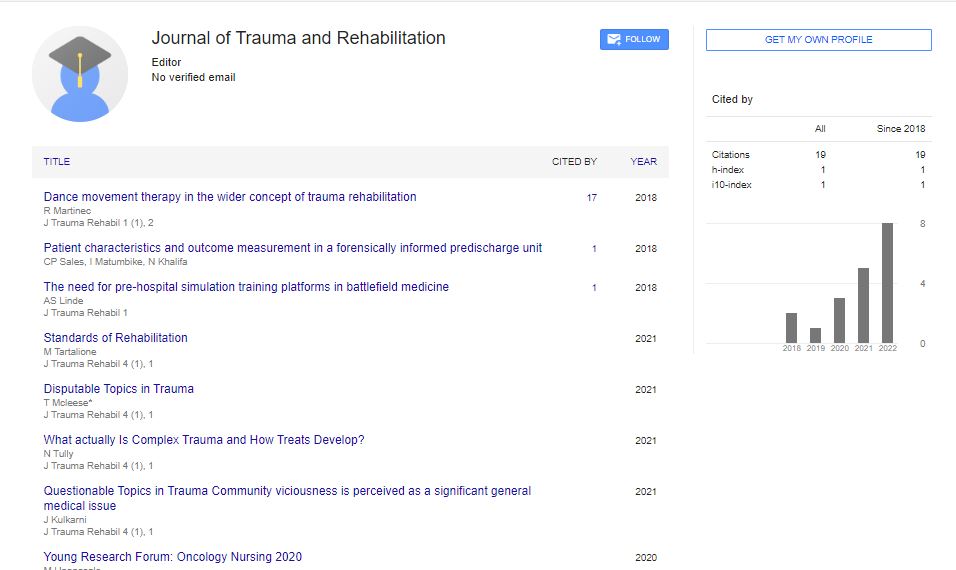Opinion Article, J Trauma Rehabil Vol: 6 Issue: 2
Understanding Post-Traumatic Development and Positive Transformation
Niko Yamamoto*
1Department of Orthopedics and Trauma, University of Tokyo Hospital, Tokyo, Japan
*Corresponding Author: Niko Yamamoto,
Department of Orthopedics and Trauma,
University of Tokyo Hospital, Tokyo, Japan
E-mail: niko.yamamoto@gmail.com
Received date: 29 May, 2023, Manuscript No. JTR-23-106893;
Editor assigned date: 31 May, 2023, PreQC No. JTR-23-106893 (PQ);
Reviewed date: 14 June, 2023, QC No. JTR-23-106893;
Revised date: 21 June, 2023, Manuscript No. JTR-23-106893 (R);
Published date: 28 June, 2023, DOI: 10.4172/Jtr.1000130
Citation: Yamamoto N (2023) Understanding Post-Traumatic Development and Positive Transformation. J Trauma Rehabil 6:2.
Description
In the face of adversity and traumatic experiences, individuals often find themselves confronted with immense pain and suffering. While the aftermath of trauma can be overwhelming, many people also discover an inner resilience that propels them toward personal growth and positive change. This phenomenon is known as Post-Traumatic Growth (PTG). Post-traumatic growth is a transformative process that enables individuals to find new perspectives, deepen their appreciation for life, and embrace a renewed sense of purpose.
Understanding post-traumatic growth
Post-traumatic growth refers to the positive psychological changes that can occur in the aftermath of a traumatic event. Contrary to the belief that trauma inevitably leads to long-lasting distress, some individuals report experiencing growth and positive transformation. The concept was first introduced by psychologists Richard Tedeschi and Lawrence Calhoun in the mid-1990s, and it has since become an area of significant studies and exploration.
Five Domains of Post-Traumatic Growth: Post-traumatic growth is often categorized into five domains:
Personal strength: A newfound sense of personal strength, resilience, and self-confidence.
Appreciation of life: A deepened appreciation for life, relationships, and simple pleasures.
Improved relationships: Strengthened relationships and a greater capacity for empathy and compassion.
New possibilities: An openness to exploring new possibilities and opportunities in life.
Spiritual or existential Growth: A reexamination of one's beliefs, values, and sense of purpose.
The role of coping mechanisms
The process of post-traumatic growth is influenced by individual coping mechanisms and adaptive responses to trauma. While some coping strategies might hinder growth, others can foster resilience and facilitate positive change.
Avoidance coping: Avoidance coping involves avoiding or suppressing thoughts and emotions related to the trauma. Although this strategy can provide temporary relief, it may impede the growth process.
Active coping: Active coping involves actively engaging with the emotional pain and seeking support from others. Embracing the pain and working through it can be a catalyst for post-traumatic growth.
Meaning-making: Finding meaning in the traumatic experience and integrating it into one's life narrative can lead to a sense of purpose and personal growth.
Narrative reconstruction
Narrative reconstruction is an essential element in the process of post-traumatic growth. It involves developing a coherent and meaningful narrative about the traumatic experience and its aftermath. Through storytelling and reflection, individuals can find new perspectives and insights, shaping their understanding of the trauma and its impact.
Rebuilding identity: Narrating the traumatic experience enables individuals to integrate the event into their life story, ultimately contributing to a stronger and more resilient sense of identity.
Making sense of pain: By attributing meaning to their suffering, individuals can transform pain into a source of wisdom and growth.
Social support and connection
Social support plays a vital role in fostering post-traumatic growth. Positive interactions with friends, family, or support groups can provide validation, empathy, and encouragement, developing a safe space for individuals to share their experiences and feelings.
Shared humanity: Connecting with others who have experienced similar traumas can remind individuals that they are not alone in their struggles, normalizing their responses and promoting growth.
Empathy and validation: Receiving empathy and validation from others can validate the emotional journey and instill hope for healing and growth.
Cultivating resilience
Resilience is a key factor in post-traumatic growth. Resilient individuals possess the ability to bounce back from adversity and develop a positive outlook on life, even in the face of significant challenges.
Strengthening coping skills: Building coping skills, emotional regulation, and problem-solving abilities can enhance resilience and facilitate post-traumatic growth.
Embracing change: Embracing change and adaptability can help individuals navigate the uncertainties that arise after a traumatic event.
Professional support and intervention
While post-traumatic growth is a natural process, professional support and intervention can significantly aid individuals on their journey. Therapists, counselors, or support groups can provide a safe and nonjudgmental environment for individuals to explore their feelings and experiences.
Trauma-focused therapy: Trauma-focused therapies, such as Cognitive-Behavioral Therapy (CBT) and Eye Movement Desensitization and Reprocessing (EMDR), can facilitate healing and growth.
Supportive interventions: Supportive interventions can help individuals process their emotions, reframe negative thoughts, and promote a sense of hope and purpose.
Conclusion
Post-traumatic growth is a testament to the human spirit's resilience and capacity for transformation. While traumatic experiences can be deeply painful and challenging, they can also serve as catalysts for profound personal growth and positive change. By embracing the journey of post-traumatic growth, individuals can emerge from their trials with newfound strength, appreciation for life, and a deeper understanding of themselves and others. The process of post-traumatic growth reminds us that even in the darkest times, there is potential for light and growth, providing hope and inspiration for those on their path to healing and transformation.
 Spanish
Spanish  Chinese
Chinese  Russian
Russian  German
German  French
French  Japanese
Japanese  Portuguese
Portuguese  Hindi
Hindi 